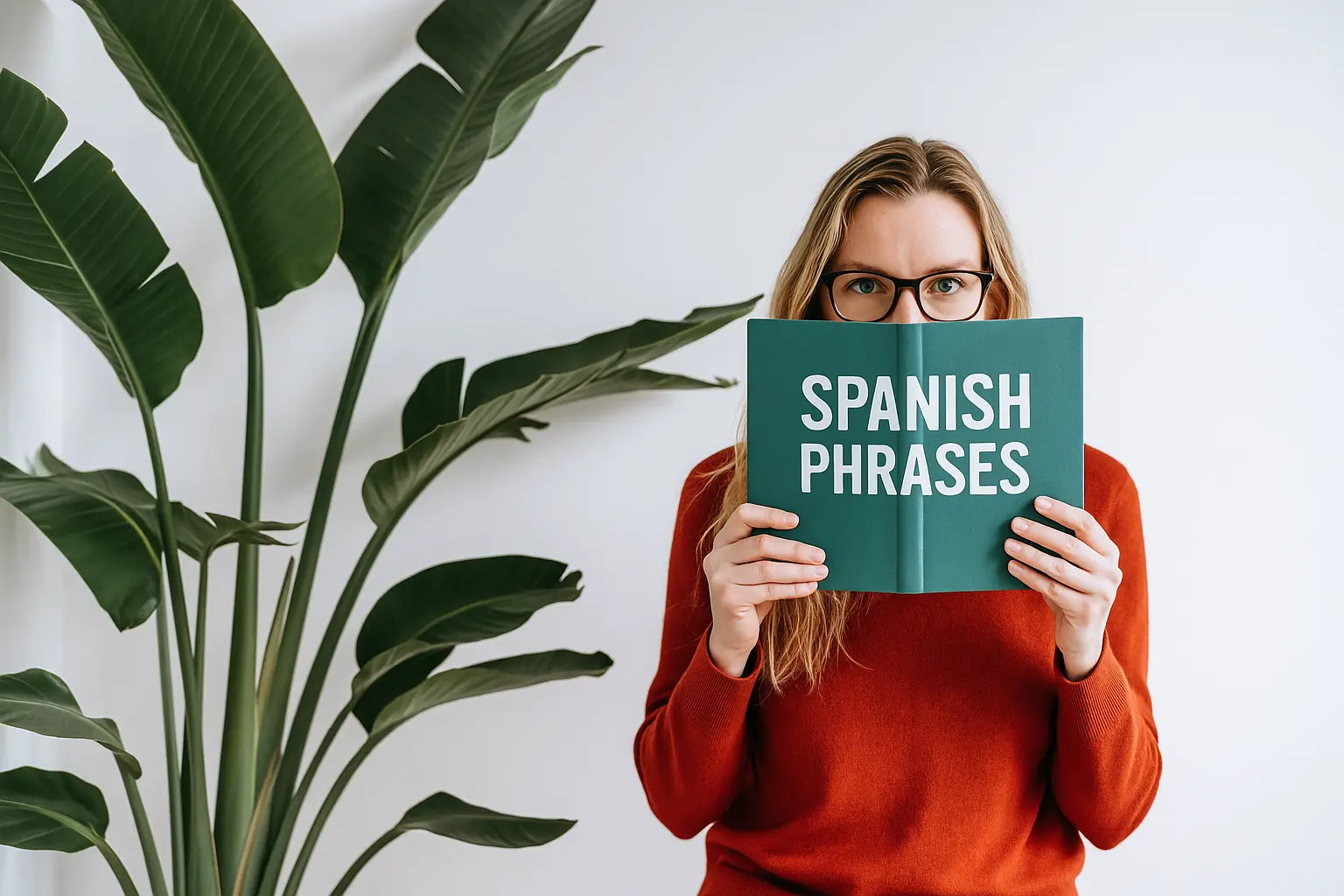1. Tío / Tía (España)
Significado: Se usa para referirse a alguien (no necesariamente un familiar).
Ejemplo: ¡Ese tío es muy gracioso!
Equivalente en inglés: Dude, guy
2. Chido / Padre (México)
Significado: Algo bueno, divertido, bonito.
Ejemplo: ¡Qué chido está tu coche!
Equivalente: Awesome, cool
3. Chévere (Sudamérica)
Significado: Genial, excelente.
Ejemplo: Esa película fue bacán.
Equivalente: Great, cool
4. Plata / Lana (Latinoamérica)
Significado: Dinero.
Ejemplo: ¿Tienes plata para el taxi?
5. Chamba
Significado: Trabajar.
Chamba (México, Perú)
6. Pegársele algo a alguien
Significado: Aprender algo sin querer o por repetición.
Ejemplo: Se me pegó esa canción, no dejo de cantarla.
Frases coloquiales para sonar más natural
1. ¡Qué fuerte!
Significado: Expresa sorpresa o incredulidad.
Ejemplo: ¿En serio dijo eso? ¡Qué fuerte!
2. ¡Anda ya! / ¡Venga ya!
Significado: Expresa sorpresa o incredulidad.
Ejemplo: ¿Ganaste la lotería? ¡Anda ya!
3. Estar en la onda
Significado: Estar actualizado, a la moda.
Ejemplo: Mi abuelo está en la onda con la tecnología.
4. Darle la lata a alguien
Significado: Molestar o insistir mucho.
Ejemplo: Mi hermano me dio la lata todo el día.
5. Estar hecho polvo
Significado: Estar muy cansado o triste.
Ejemplo: Después del viaje, estoy hecho polvo.
6. Estar a tope
Significado: Estar muy ocupado o hacer algo con mucha energía.
Ejemplo: Hoy estoy a tope de trabajo.
7. Ir al grano
Significado: Hablar directamente, sin rodeos.
Ejemplo: Vamos al grano, ¿qué necesitas?
Colloquial Words Native Spanish Speakers Use All the Time
1. Tío / Tía (Spain)
Meaning: Used to refer to someone (not necessarily a relative).
Example: ¡Ese tío es muy gracioso!
English equivalent: Dude, guy
2. Chido / Padre (Mexico)
Meaning: Something cool, fun, or nice.
Example: ¡Qué chido está tu coche!
English equivalent: Awesome, cool
3. Chévere (South America)
Meaning: Great, excellent.
Example: Esa película fue bacán.
English equivalent: Great, cool
4. Plata / Lana (Latin America)
Meaning: Money.
Example: ¿Tienes plata para el taxi?
5. Chamba
Meaning: To work (informal).
Chamba is commonly used in Mexico and Peru.
6. Pegársele algo a alguien
Meaning: To learn or pick up something unintentionally or by repetition.
Example: Se me pegó esa canción, no dejo de cantarla.
English equivalent: That song got stuck in my head.
Colloquial Phrases to Sound More Natural
1. ¡Qué fuerte!
Meaning: Used to express surprise or disbelief.
Example: ¿En serio dijo eso? ¡Qué fuerte!
English equivalent: Wow! / That’s intense!
2. ¡Anda ya! / ¡Venga ya!
Meaning: Used to express surprise or disbelief.
Example: ¿Ganaste la lotería? ¡Anda ya!
English equivalent: No way! / You’re kidding!
3. Estar en la onda
Meaning: To be up-to-date or trendy.
Example: Mi abuelo está en la onda con la tecnología.
English equivalent: To be in the loop / To be with it
4. Darle la lata a alguien
Meaning: To annoy or bother someone, to insist a lot.
Example: Mi hermano me dio la lata todo el día.
English equivalent: To bug someone / To be a pain
5. Estar hecho polvo
Meaning: To be very tired or emotionally drained.
Example: Después del viaje, estoy hecho polvo.
English equivalent: To be worn out / To be exhausted
6. Estar a tope
Meaning: To be very busy or give maximum effort.
Example: Hoy estoy a tope de trabajo.
English equivalent: To be swamped / To be going full throttle
7. Ir al grano
Meaning: To get straight to the point.
Example: Vamos al grano, ¿qué necesitas?
English equivalent: Let’s get to the point / Cut to the chase
Colloquial Phrases to Sound More Natural
1. ¡Qué fuerte!
Meaning: Used to express surprise or disbelief.
Example: ¿En serio dijo eso? ¡Qué fuerte!
English equivalent: Wow! / That’s intense!
2. ¡Anda ya! / ¡Venga ya!
Meaning: Used to express surprise or disbelief.
Example: ¿Ganaste la lotería? ¡Anda ya!
English equivalent: No way! / You’re kidding!
3. Estar en la onda
Meaning: To be up-to-date or trendy.
Example: Mi abuelo está en la onda con la tecnología.
English equivalent: To be in the loop / To be with it
4. Darle la lata a alguien
Meaning: To annoy or bother someone, to insist a lot.
Example: Mi hermano me dio la lata todo el día.
English equivalent: To bug someone / To be a pain
5. Estar hecho polvo
Meaning: To be very tired or emotionally drained.
Example: Después del viaje, estoy hecho polvo.
English equivalent: To be worn out / To be exhausted
6. Estar a tope
Meaning: To be very busy or give maximum effort.
Example: Hoy estoy a tope de trabajo.
English equivalent: To be swamped / To be going full throttle
7. Ir al grano
Meaning: To get straight to the point.
Example: Vamos al grano, ¿qué necesitas?
English equivalent: Let’s get to the point / Cut to the chase
Colloquial Words Native Spanish Speakers Use All the Time
1. Tío / Tía (Spain)
Meaning: Used to refer to someone (not necessarily a relative).
Example: ¡Ese tío es muy gracioso!
English equivalent: Dude, guy
2. Chido / Padre (Mexico)
Meaning: Something cool, fun, or nice.
Example: ¡Qué chido está tu coche!
English equivalent: Awesome, cool
3. Chévere (South America)
Meaning: Great, excellent.
Example: Esa película fue bacán.
English equivalent: Great, cool
4. Plata / Lana (Latin America)
Meaning: Money.
Example: ¿Tienes plata para el taxi?
5. Chamba
Meaning: To work (informal).
Chamba is commonly used in Mexico and Peru.
6. Pegársele algo a alguien
Meaning: To learn or pick up something unintentionally or by repetition.
Example: Se me pegó esa canción, no dejo de cantarla.
English equivalent: That song got stuck in my head.

